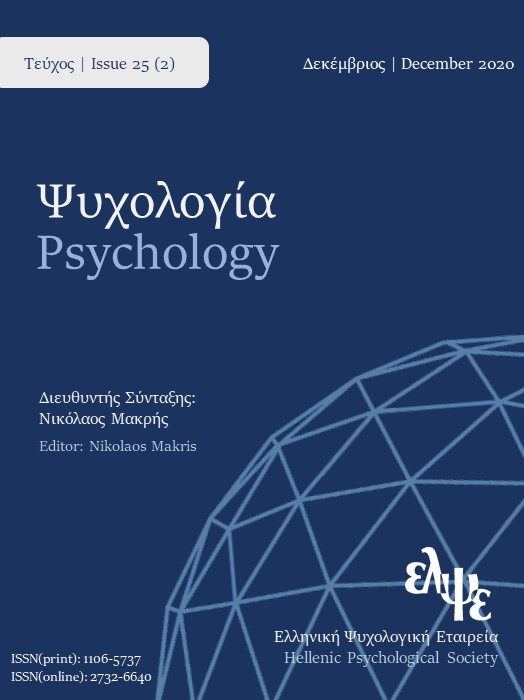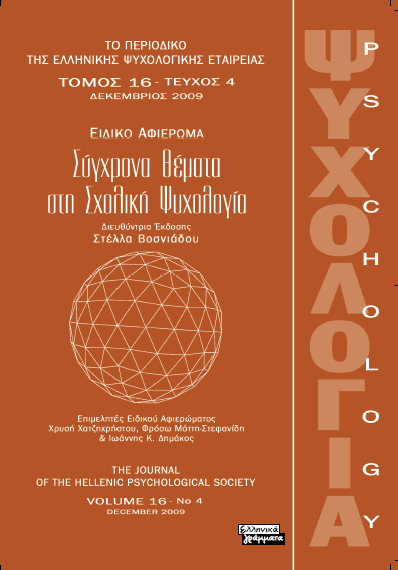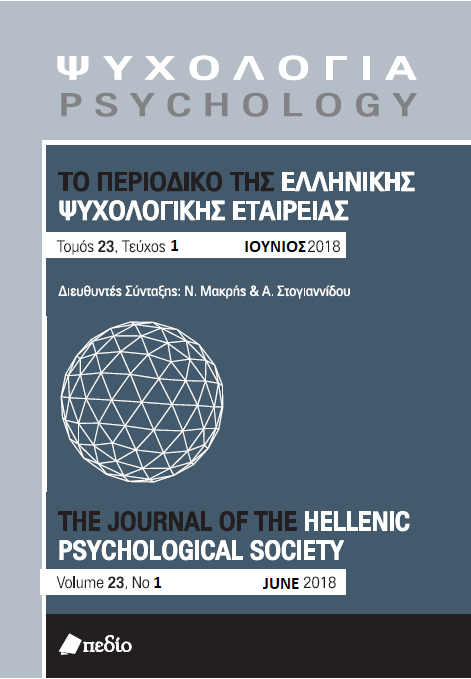Κρίση αξιών ή οι αξίες της κρίσης: Σταθερότητα και μεταβολή προσωπικών και πολιτικών αξιών στην Ελλάδα της ύφεσης
Περίληψη
Η έρευνα αυτή επιχειρεί να εξετάσει τη σταθερότητα και τη μεταβολή των προσωπικών αξιών, των πολιτικών αξιών και της πολιτικής ιδεολογίας στην Ελλάδα κατά τη διάρκεια της οικονομικής κρίσης. Με βάση την εκσυγχρονιστική θεωρία του Inglehart (1971, 2008) και το μοντέλο διπλής επεξεργασίας για τους προσδιοριστικούς παράγοντες της πολιτικής ιδεολογίας (Duckitt & Sibley, 2010), υποθέσαμε ότι η πρόσληψη της κρίσης ως απειλής θα οδηγήσει σε υποχώρηση των αξιών που σχετίζονται με την ελευθερία από το άγχος και σε μετακίνηση προς το συντηρητισμό. Παράλληλα, εξετάστηκαν οι συσχετίσεις των αξιών με την ιδεολογία, καθώς και η σύγκλιση ενός δομικού μοντέλου των συσχετίσεων αυτών με τα θεωρητικά σχήματα, συγκριτικά για τους δύο χρόνους μέτρησης. Το δείγμα αποτέλεσαν 385 άτομα (52% γυναίκες, μέση ηλικία 41,7 έτη) το 2009 και 521 άτομα (50% γυναίκες, μέση ηλικία 38,7 έτη) το 2014. Οι συμμετέχοντες συμπλήρωσαν ερωτηματολόγια αυτοαναφοράς για τις προσωπικές αξίες (Schwartz και συν., 2001), τις πολιτικές αξίες (Schwartz και συν., 2010) και την πολιτική ιδεολογία (αριστερά/δεξιά). Τα ευρήματα στήριξαν μόνο μερικώς τις ερευνητικές υποθέσεις, καθώς καταγράφηκε υποχώρηση των αξιών της αυθυπέρβασης (παγκοσμιότητα, ισοτιμία), αλλά συγχρόνως και του συντηρητισμού (παράδοση, συμμόρφωση, ασφάλεια), αν και μικρού μεγέθους. Από το άλλο μέρος, η υιοθέτηση συντηρητικών αξιών οδήγησε σε πιο δεξιό προσανατολισμό στο δεύτερο χρόνο μέτρησης (2014). Επιπλέον, επιβεβαιώθηκε η σταθερότητα ενός αξιακού μοντέλου της ιδεολογίας που περιλαμβάνει δύο συνιστώσες: διατήρηση έναντι αλλαγής του status και αποδοχή έναντι απόρριψης των κοινωνικών ανισοτήτων.
Λεπτομέρειες άρθρου
- Πώς να δημιουργήσετε Αναφορές
-
Παυλόπουλος Β. (2020). Κρίση αξιών ή οι αξίες της κρίσης: Σταθερότητα και μεταβολή προσωπικών και πολιτικών αξιών στην Ελλάδα της ύφεσης. Ψυχολογία: το περιοδικό της Ελληνικής Ψυχολογικής Εταιρείας, 21(3), 334–353. https://doi.org/10.12681/psy_hps.23502
- Τεύχος
- Τόμ. 21 Αρ. 3 (2014)
- Ενότητα
- ΕΙΔΙΚΟ ΑΦΙΕΡΩΜΑ

Αυτή η εργασία είναι αδειοδοτημένη υπό το Creative Commons Attribution-ShareAlike 4.0 International License.
Το περιοδικό ΨΥΧΟΛΟΓΙΑ έχει υιοθετήσει μία πολιτική Platinum open-access. Τα έξοδα υποβολής, επεξεργασίας ή δημοσίευσης των εργασιών καλύπτονται από την Ελληνική Ψυχολογική Εταιρεία. Τα πνευματικά δικαιώματα των δημοσιευμένων εργασιών προστατεύονται από την άδεια 'Creative Commons Attribution-ShareAlike 4.0 International'. Οι Συγγραφείς διατηρούν τα Πνευματικά Δικαιώματα και χορηγούν στο περιοδικό το δικαίωμα της πρώτης δημοσίευσης. Η άδεια αυτή επιτρέπει σε τρίτους, να χρησιμοποιούν την εργασία σε οποιαδήποτε μορφή, με την προϋπόθεση της διατήρησης των διατυπώσεων που προβλέπονται στην άδεια σχετικά με την αναφορά στον αρχικό δημιουργό και την αρχική δημοσίευση στο περιοδικό ΨΥΧΟΛΟΓΙΑ. Επιπλέον, κάθε διανομή της εργασίας οφείλει να γίνεται με τους ίδιους όρους διανομής, δηλαδή με την ίδια άδεια Creative Commons.













